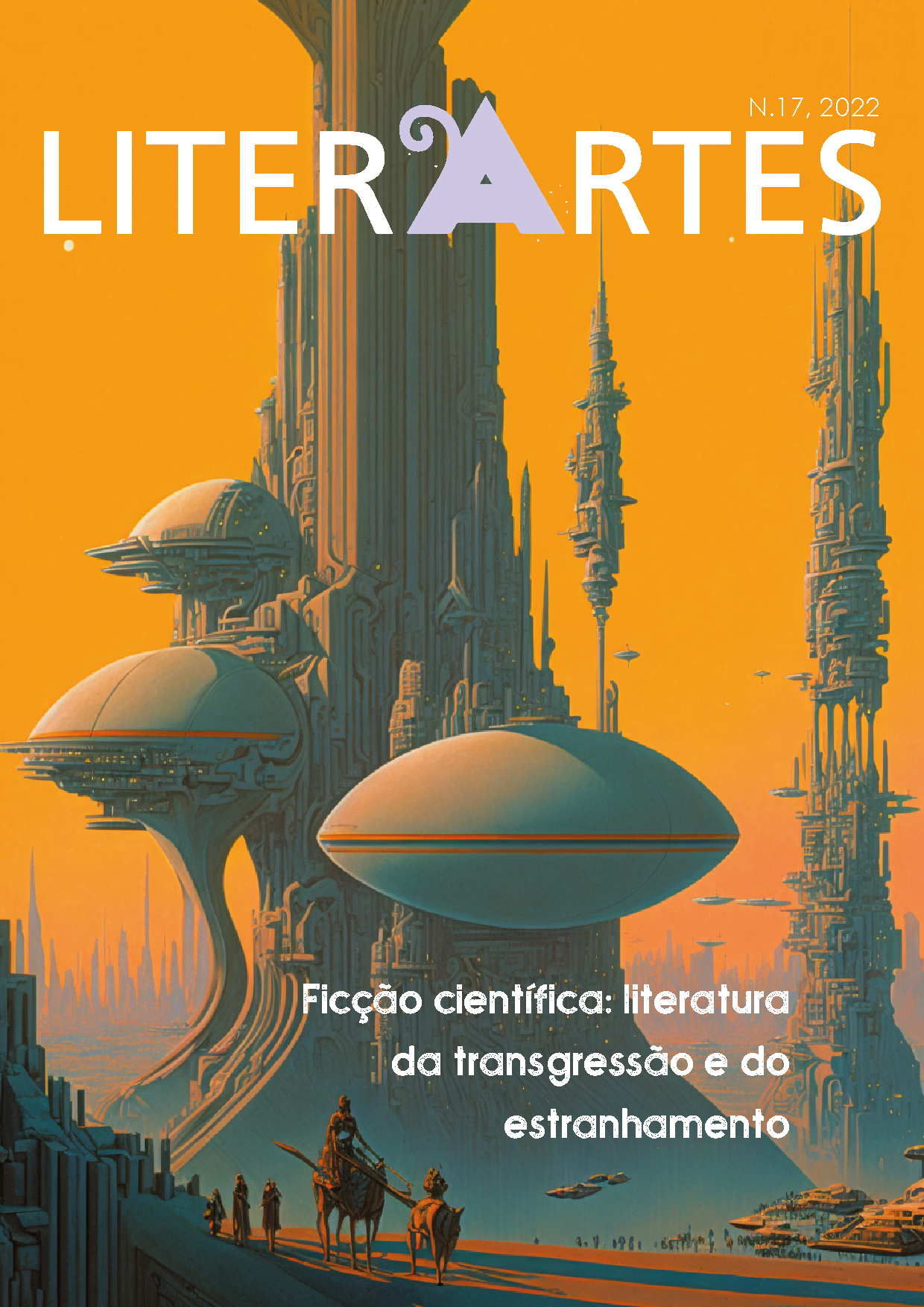There will come nuclear winters: chaos and ruin in the eternal future of the cold war
DOI:
https://doi.org/10.11606/issn.2316-9826.literartes.2022.195825Keywords:
Ray Bradbury, Martian Chronicles, Anthropomorfization, Science fictionAbstract
The present article proposes an analysis of the short story “There Will Come Soft Rains”, written by the North-american author Ray Bradbury. The story, afterwards put into a greater narrative to form the book The Martian Chronicles, the author describes the end of the lonely existence of the last automated house in the wastes of a nuclear holocaust. Using the theory of such authors as Julio Cortázar, Jorge Luis Borges and Tzvetan Todorov, the article seeks to analyze the author’s use of the tools of anthropomorphization and of the Aristotelian Rethorical Passions to write a narrative of human values and the struggle of man, through technological legacy and its permanence, against human biological ephemerality.
References
BORGES, Jorge L. Apresentação. In: BRADBURY, Ray. As Crônicas Marcianas. 1.ed. São Paulo: Biblioteca Azul, 2013, p. 09-11.
BRADBURY, Ray. There Will Come Soft Rains. In: BRADBURY, Ray. The Martian Chronicles. 10.ed. New York: Bantam Books, 1979, p. 242-249.
CARRERA, Francisco J.F. Mundos en desaparición, distopías posibles. Una aproximación al relato There Will Come Soft Rains de Ray Bradbury desde la didáctica de la lengua y la literatura inglesa y desde la didáctica de la contención y de la creatividad. In: Nudos, Valladolid: 2 (1), 36-54, 2018.
CLEANLINESS IS NEXT TO GODLINESS. In: Collins Online Dictionary. Glasgow: Harper Collins, 2022. Disponível em: https://www.collinsdictionary.com/dictionary/english/cleanliness-is-next-to-godliness. Acesso em: 02 mar. 2022.
CORTÁZAR, Julio. Alguns Aspectos do Conto. In: CORTÁZAR, Julio. Valise de cronópio. 2.ed. São Paulo: Perspectiva, 2006a, p. 147-163.
CORTÁZAR, Julio. Do Conto Breve e seus Arredores. In: CORTÁZAR, Julio. Valise de cronópio. 2.ed. São Paulo: Perspectiva, 2006b, p. 227-237.
ENNS, Anthony. The Poet of the Pulps: Ray Bradbury and the Struggle for Prestige in Postwar Science Fiction. In: Belphégor, Online: 1 (13-1): 154-181, jun. 2015.
GREGERSEN, Erik. Ray Bradbury. Encyclopædia Britannica, 2020. Disponível em: https://www.britannica.com/biography/Ray-Bradbury. Acesso em 23 nov. 2020.
O'LEARY, Devin D. An Interview with Ray Bradbury. Weekly Alibi, Albuquerque, 1999. Seção Books. Disponível em: http://weeklywire.com/ww/09-27-99/alibi_feat1.html. Acesso em: 23 nov. 2020.
POE, Edgar A. A Filosofia da Composição. In: POE, Edgar A. Ficção Completa, Poesia e Ensaios. 2.ed. Rio de Janeiro: Nova Aguilar, 2001, p. 911-920.
TODOROV, Tzvetan. A narrativa fantástica. In: TODOROV, Tzvetan. As estruturas narrativas. 4.ed. São Paulo: Perspectiva, 1979, p. 147-166.
WELLER, Sam. Ray Bradbury, The Art of Fiction No. 203. The Paris Review. Nova Iorque, 2020. Disponível em: https://www.theparisreview.org/interviews/6012/the-art-of-fiction-no-203-ray-bradbury. Acesso em: 23 nov. 2020.
Downloads
Published
Issue
Section
License
Copyright (c) 2022 William F.S. Alves, Aparecido Rossi

This work is licensed under a Creative Commons Attribution-NonCommercial 4.0 International License.
Autores que publicam nesta revista concordam com os seguintes termos:
- Autores mantém os direitos autorais e concedem à revista o direito de primeira publicação, com o trabalho simultaneamente licenciado sob a Licença Creative Commons Attribution que permite o compartilhamento do trabalho com reconhecimento da autoria e publicação inicial nesta revista.
- Autores têm autorização para assumir contratos adicionais separadamente, para distribuição não-exclusiva da versão do trabalho publicada nesta revista (ex.: publicar em repositório institucional ou como capítulo de livro), com reconhecimento de autoria e publicação inicial nesta revista.
- Autores têm permissão e são estimulados a publicar e distribuir seu trabalho online (ex.: em repositórios institucionais ou na sua página pessoal) a qualquer ponto antes ou durante o processo editorial, já que isso pode gerar alterações produtivas, bem como aumentar o impacto e a citação do trabalho publicado (Veja O Efeito do Acesso Livre).



